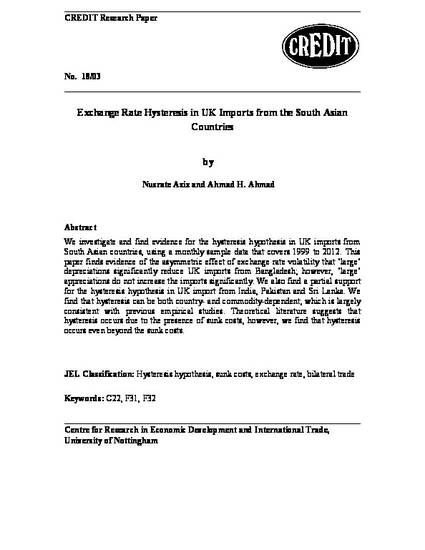
Unpublished Paper
18-03 CREDIT_Hysteresis.pdf
Centre for Research in Economic Development and International Trade, (CREDIT 18/3), University of Nottingham, UK
(2018)
Abstract
We investigate and find evidence for the hysteresis hypothesis in UK imports from South Asian countries, using a monthly sample data that covers 1999 to 2012. This paper finds evidence of the asymmetric effect of exchange rate volatility that ‘large’ depreciations significantly reduce UK imports from Bangladesh; however, ‘large’ appreciations do not increase the imports significantly. We also find a partial support for exchange rate hysteresis in UK imports from India, Pakistan and Sri Lanka. We find that hysteresis can be both country- and commodity-dependent, which is largely consistent with previous empirical studies. Theoretical literature suggests that hysteresis occurs due to the presence of sunk costs, but we find that sunk costs alone do not explain the level of hysteresis.
Keywords
- Hysteresis hypothesis,
- sunk costs,
- exchange rate,
- bilateral trade
Disciplines
Publication Date
Winter February 14, 2018
DOI
http://www.euni.de/tools/jobpopup.php?lang=en&option=showJobs&jobid=5498&jobtyp=15&university=University+of+Nottingham&country=UK&sid=5789
Citation Information
Nusrate Aziz. "18-03 CREDIT_Hysteresis.pdf" Centre for Research in Economic Development and International Trade, (CREDIT 18/3), University of Nottingham, UK (2018) Available at: http://works.bepress.com/nusrate_aziz/31/
